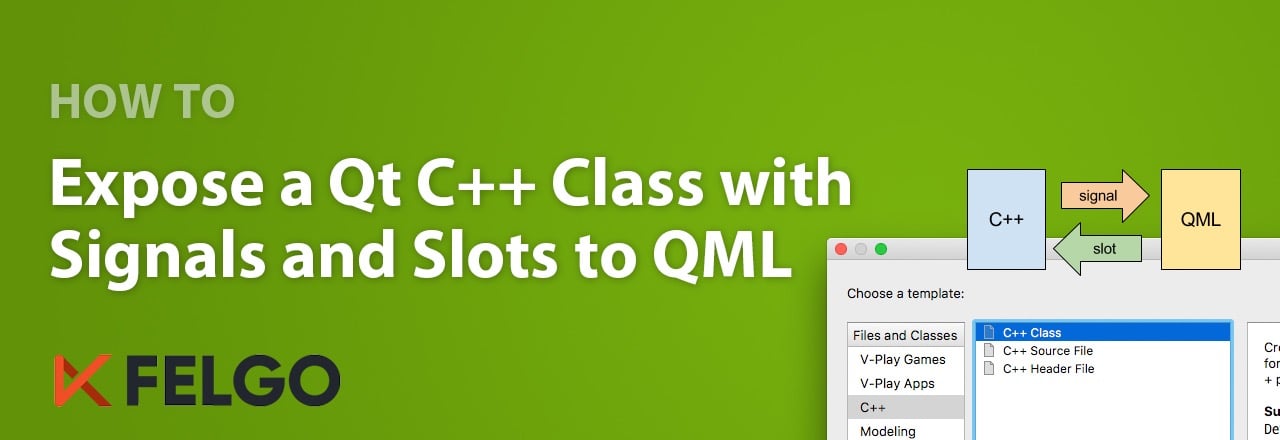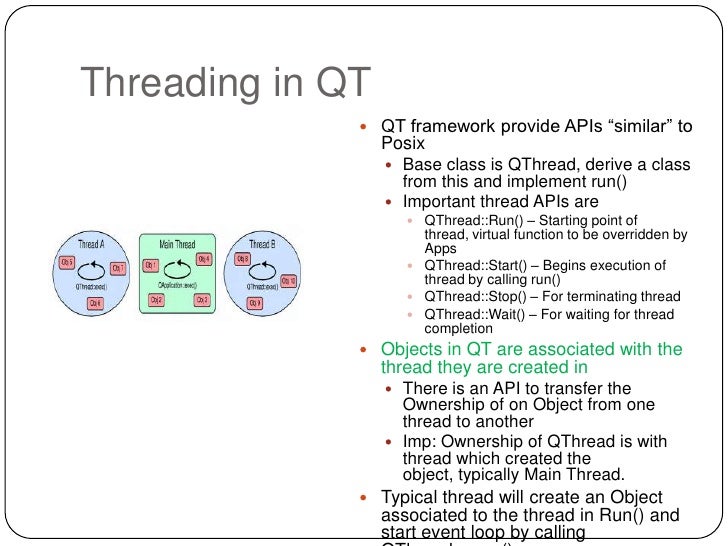Qt Signal Slot Thread Safe
Qt - SigSlot - Boost Libraries Qt was the original signal/slots implementation, but it Sigslot and Boost on the other hand are pure ISO C, but both have some disadvantages. None of these are thread-safe and it can be somewhat inconvenient manually Qt documentation states that signals and slots can be direct, queued and auto. I have GUI Thread which creates & manages the GUI content. Now when the application is idle i.e. All threads are idle (or even if only the GUI thread is idle) then I want my QMainWindow inherited class's object to emit a SIGNAL. So that whenever the Application is idle I will silently create the Wid.
- Qt Signal Slot Thread Safe Vs
- Qt Signal Slot Thread
- Qt Signal Slot Thread Safe Code
- Qt Signal Thread
- Qt Signal Slot Example
- Qt Signal Slot Performance
EnArBgDeElEsFaFiFrHiHuItJaKnKoMsNlPlPtRuSqThTrUkZh
This page was used to describe the new signal and slot syntax during its development. The feature is now released with Qt 5.
- Differences between String-Based and Functor-Based Connections (Official documentation)
- Introduction (Woboq blog)
- Implementation Details (Woboq blog)
Note: This is in addition to the old string-based syntax which remains valid.
- 1Connecting in Qt 5
- 2Disconnecting in Qt 5
- 4Error reporting
- 5Open questions
Connecting in Qt 5
There are several ways to connect a signal in Qt 5.
Old syntax
Qt 5 continues to support the old string-based syntax for connecting signals and slots defined in a QObject or any class that inherits from QObject (including QWidget)
New: connecting to QObject member
Here's Qt 5's new way to connect two QObjects and pass non-string objects:
Pros
- Compile time check of the existence of the signals and slot, of the types, or if the Q_OBJECT is missing.
- Argument can be by typedefs or with different namespace specifier, and it works.
- Possibility to automatically cast the types if there is implicit conversion (e.g. from QString to QVariant)
- It is possible to connect to any member function of QObject, not only slots.
Cons
- More complicated syntax? (you need to specify the type of your object)
- Very complicated syntax in cases of overloads? (see below)
- Default arguments in slot is not supported anymore.
New: connecting to simple function
The new syntax can even connect to functions, not just QObjects:
Pros
- Can be used with std::bind:
- Can be used with C++11 lambda expressions:
Cons
- There is no automatic disconnection when the 'receiver' is destroyed because it's a functor with no QObject. However, since 5.2 there is an overload which adds a 'context object'. When that object is destroyed, the connection is broken (the context is also used for the thread affinity: the lambda will be called in the thread of the event loop of the object used as context).
Disconnecting in Qt 5
As you might expect, there are some changes in how connections can be terminated in Qt 5, too.
Old way
You can disconnect in the old way (using SIGNAL, SLOT) but only if
- You connected using the old way, or
- If you want to disconnect all the slots from a given signal using wild card character
Qt Signal Slot Thread Safe Vs
Symetric to the function pointer one
Only works if you connected with the symmetric call, with function pointers (Or you can also use 0 for wild card)In particular, does not work with static function, functors or lambda functions.
New way using QMetaObject::Connection
Works in all cases, including lambda functions or functors.
Asynchronous made easier
With C++11 it is possible to keep the code inline
Here's a QDialog without re-entering the eventloop, and keeping the code where it belongs:
Another example using QHttpServer : http://pastebin.com/pfbTMqUm
Error reporting
Tested with GCC.
Fortunately, IDEs like Qt Creator simplifies the function naming
Missing Q_OBJECT in class definition
Type mismatch
Open questions
Default arguments in slot
If you have code like this:

The old method allows you to connect that slot to a signal that does not have arguments.But I cannot know with template code if a function has default arguments or not.So this feature is disabled.

There was an implementation that falls back to the old method if there are more arguments in the slot than in the signal.This however is quite inconsistent, since the old method does not perform type-checking or type conversion. It was removed from the patch that has been merged.
Overload
As you might see in the example above, connecting to QAbstractSocket::error is not really beautiful since error has an overload, and taking the address of an overloaded function requires explicit casting, e.g. a connection that previously was made as follows:
connect(mySpinBox, SIGNAL(valueChanged(int)), mySlider, SLOT(setValue(int));
cannot be simply converted to:
...because QSpinBox has two signals named valueChanged() with different arguments. Instead, the new code needs to be:
Unfortunately, using an explicit cast here allows several types of errors to slip past the compiler. Adding a temporary variable assignment preserves these compile-time checks:
Some macro could help (with C++11 or typeof extensions). A template based solution was introduced in Qt 5.7: qOverload
The best thing is probably to recommend not to overload signals or slots …
… but we have been adding overloads in past minor releases of Qt because taking the address of a function was not a use case we support. But now this would be impossible without breaking the source compatibility.
Disconnect
Should QMetaObject::Connection have a disconnect() function?
The other problem is that there is no automatic disconnection for some object in the closure if we use the syntax that takes a closure.One could add a list of objects in the disconnection, or a new function like QMetaObject::Connection::require
Callbacks
Function such as QHostInfo::lookupHost or QTimer::singleShot or QFileDialog::open take a QObject receiver and char* slot.This does not work for the new method.If one wants to do callback C++ way, one should use std::functionBut we cannot use STL types in our ABI, so a QFunction should be done to copy std::function.In any case, this is irrelevant for QObject connections.
While the purpose of threads is to allow code to run in parallel, there are times where threads must stop and wait for other threads. For example, if two threads try to write to the same variable simultaneously, the result is undefined. The principle of forcing threads to wait for one another is called mutual exclusion. It is a common technique for protecting shared resources such as data.

Qt provides low-level primitives as well as high-level mechanisms for synchronizing threads.
Low-Level Synchronization Primitives
QMutex is the basic class for enforcing mutual exclusion. A thread locks a mutex in order to gain access to a shared resource. If a second thread tries to lock the mutex while it is already locked, the second thread will be put to sleep until the first thread completes its task and unlocks the mutex.
QReadWriteLock is similar to QMutex, except that it distinguishes between 'read' and 'write' access. When a piece of data is not being written to, it is safe for multiple threads to read from it simultaneously. A QMutex forces multiple readers to take turns to read shared data, but a QReadWriteLock allows simultaneous reading, thus improving parallelism.
QSemaphore is a generalization of QMutex that protects a certain number of identical resources. In contrast, a QMutex protects exactly one resource. The Semaphores Example shows a typical application of semaphores: synchronizing access to a circular buffer between a producer and a consumer.
QWaitCondition synchronizes threads not by enforcing mutual exclusion but by providing a condition variable. While the other primitives make threads wait until a resource is unlocked, QWaitCondition makes threads wait until a particular condition has been met. To allow the waiting threads to proceed, call wakeOne() to wake one randomly selected thread or wakeAll() to wake them all simultaneously. The Wait Conditions Example shows how to solve the producer-consumer problem using QWaitCondition instead of QSemaphore.
Note: Qt's synchronization classes rely on the use of properly aligned pointers. For instance, you cannot use packed classes with MSVC.
Qt Signal Slot Thread
These synchronization classes can be used to make a method thread safe. However, doing so incurs a performance penalty, which is why most Qt methods are not made thread safe.
Risks
If a thread locks a resource but does not unlock it, the application may freeze because the resource will become permanently unavailable to other threads. This can happen, for example, if an exception is thrown and forces the current function to return without releasing its lock.
Another similar scenario is a deadlock. For example, suppose that thread A is waiting for thread B to unlock a resource. If thread B is also waiting for thread A to unlock a different resource, then both threads will end up waiting forever, so the application will freeze.
Convenience classes
QMutexLocker, QReadLocker and QWriteLocker are convenience classes that make it easier to use QMutex and QReadWriteLock. They lock a resource when they are constructed, and automatically unlock it when they are destroyed. They are designed to simplify code that use QMutex and QReadWriteLock, thus reducing the chances that a resource becomes permanently locked by accident.
Qt Signal Slot Thread Safe Code
High-Level Event Queues
Qt's event system is very useful for inter-thread communication. Every thread may have its own event loop. To call a slot (or any invokable method) in another thread, place that call in the target thread's event loop. This lets the target thread finish its current task before the slot starts running, while the original thread continues running in parallel.

To place an invocation in an event loop, make a queued signal-slot connection. Whenever the signal is emitted, its arguments will be recorded by the event system. The thread that the signal receiver lives in will then run the slot. Alternatively, call QMetaObject::invokeMethod() to achieve the same effect without signals. In both cases, a queued connection must be used because a direct connection bypasses the event system and runs the method immediately in the current thread.
Qt Signal Thread
There is no risk of deadlocks when using the event system for thread synchronization, unlike using low-level primitives. However, the event system does not enforce mutual exclusion. If invokable methods access shared data, they must still be protected with low-level primitives.
Having said that, Qt's event system, along with implicitly shared data structures, offers an alternative to traditional thread locking. If signals and slots are used exclusively and no variables are shared between threads, a multithreaded program can do without low-level primitives altogether.
Qt Signal Slot Example
See also QThread::exec() and Threads and QObjects.
Qt Signal Slot Performance
© 2020 The Qt Company Ltd. Documentation contributions included herein are the copyrights of their respective owners. The documentation provided herein is licensed under the terms of the GNU Free Documentation License version 1.3 as published by the Free Software Foundation. Qt and respective logos are trademarks of The Qt Company Ltd. in Finland and/or other countries worldwide. All other trademarks are property of their respective owners.